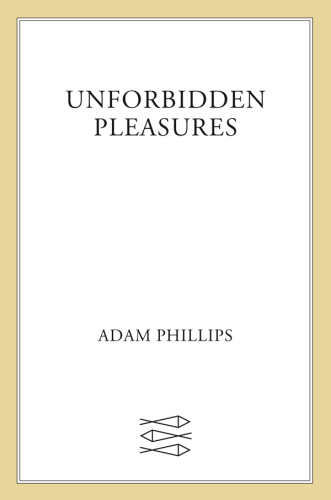
Unforbidden Pleasures
کتاب های مرتبط
- اطلاعات
- نقد و بررسی
- دیدگاه کاربران
نقد و بررسی

February 29, 2016
Phillips (On Kissing, Tickling, and Being Bored), a British psychoanalyst, explores the tension between ”forbidden” and “unforbidden” pleasures in this dense, erudite book. Going back to the story of Genesis and to Milton’s retelling of it in Paradise Lost, he argues that modern Western culture remains constrained by the association between the pleasurable and the taboo. In reality, Phillips asserts, people often draw more pleasure from the ordinary things in life—a morning cup of coffee, one another’s company, kindness—than from forbidden acts. He goes on to name more unforbidden pleasures, including self-criticism and obedience, noting about the latter that “whom we obey and how we obey—and what we are doing when we obey—will be the defining factors in our lives.” Philips suggests that people can become less judgmental about permissible types of pleasure by changing their moral vocabulary. In this, he draws inspiration from the writings of Oscar Wilde, Friedrich Nietzsche, and Sigmund Freud, each of whom, he shows, recommended the replacement of certain words with others—“beauty” rather than “goodness,” “delight” rather than “duty”—in order to reshape people’s underlying ideas. Digressive and often paradoxical, this slim volume is rich in psychological, philosophical, and literary insight. Agent: Amy Rennert, Amy Rennert Agency.

March 1, 2016
What would society look like if it did not promote the idea "that we are primarily a danger to ourselves and others"? In his latest philosophical exploration of mind, selfhood, and desire, prolific British psychoanalyst Phillips (Becoming Freud: The Making of a Psychoanalyst, 2014, etc.) asks how the idea of forbidden pleasures shapes thought and behavior. "This book," he writes, "is about whether the unforbidden pleasures have something more to tell us, or at least something else to tell us, about pleasure than the forbidden ones." The "tyranny of the forbidden," he maintains, "is not that it forbids, but that it tells us what we want--to do the forbidden thing." What is forbidden, then, "narrows our minds, narrows our picture of ourselves"--in short, it circumscribes our freedom to know ourselves. Phillips draws on wide-ranging sources from literature (Shakespeare, Milton, Wilde), philosophy (Nietzsche, Jonathan Lear, Stuart Hampshire), and psychology (Freud, of course, and also Jacques Lacan, D.W. Winnicott, and neuropsychologist Brenda Milner) in his discussions of obedience, self-criticism, sexual taboos, and the concept of the superego. "The Freudian superego," writes Phillips, "is a boring and vicious soliloquist with an audience of one," a "made-up voice" distinct from the religious and cultural legacy of conscience. The patient undergoing analysis "discovers he is the casualty of forgotten obediences," not all of which he may want to discard. Psychoanalysis encourages a conversation about the forbidden, allowing the patient a chance to make choices "about which rules he believes are worth following, and which rules he has merely been following, consciously or unconsciously, for fear of punishment." Finding pleasure in the unforbidden, Phillips suggests, means "finding new kinds of heroes and heroines (or dispensing with them)" and redefining what we mean by satisfaction. A dense, challenging, provocative meditation on morality and identity.
COPYRIGHT(2016) Kirkus Reviews, ALL RIGHTS RESERVED.

March 15, 2016
Traditionally, "forbidden fruit" has been viewed as a harmful but supreme lure for humanity. Psychoanalyst and visiting professor Phillips (English, Univ. of York, UK; Going Sane) examines the effects of this outlook on psychology and the social order. Beginning with Oscar Wilde but dense with other classic references, the author discusses the concepts of forbidden and unforbidden pleasures. The former can be understood as a reflection of the Ten Commandments and includes transgressions against other moral principles. Phillips notes how psychoanalysis itself focuses on the forbidden. Less-intuitive notions of pleasures such as obedience and self-criticism are then discussed. Drawing on British psychoanalytic work, he details life-enhancing forms of unforbidden pleasure to include affection, friendship, and imagination, which are considered as necessary antidotes to the tyranny of forbidden pleasure on social life. The book concludes with a discussion of the meaning of life and its enjoyment. The author intimates that modern Western society would benefit from more emphasis on unforbidden pleasure in morality and social organization but provides no easy pathway to such a change. VERDICT An abstract but bold social critique and meditation that may require a humanistic background to appreciate fully.--Antoinette Brinkman, formerly with Southwest Indiana Mental Health Ctr. Lib., Evansville
Copyright 2016 Library Journal, LLC Used with permission.

























دیدگاه کاربران